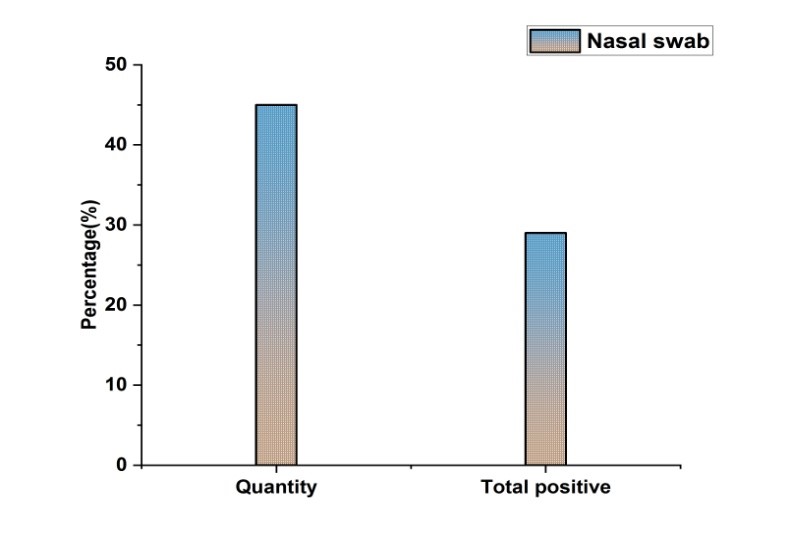Exploring the Presence of Methicillin Resistant Staphylococcus aureus (MRSA)-Encoding Gene in Dogs' Nasal Swab Samples
Abstract
This research aimed to identify the gene responsible for Methicillin Resistant Staphylococcus aureus (MRSA) production in canine nasal swabs taken from the Surabaya, Indonesia. There were 85 places in Surabaya where dogs' nostrils were swabbed. Identification of bacteria included growth on Mannitol Salt Agar, Gram staining, and tests for the enzyme catalase coagulase and Voges Proskauer (VP). Staphylococcus aureus bacteria were successfully isolated from 47 90 specimens (50.59 %). The percentage of MRSA isolates confirmed by the Oxacillin Resistant Screen Agar Base (ORSAB) was 29.41% through 30 isolates. The existence of the mecA gene could not be established in 10 (5.88%) of the isolates using PCR-based genetic analysis. It was determined that domesticated dogs provide a public health risk by serving as a reservoir for MRSA strains. To better understand the incidence and possible significance of dogs in MRSA exchange, investigators and veterinary practitioners may examine the presence of MRSA-encoding genes in nasal swab samples from dogs.
References
Bietrix, J., Kolenda, C., Sapin, A., Haenni, M., Madec, J. Y., Bes, M., & Laurent, F. (2019). Persistence and diffusion of mec C-positive CC130 MRSA isolates in Meurthe-et-Moselle County (France) dairy farms. Frontiers in Microbiology, 10, 47.
Penna, B., Silva, M. B., Soares, A. E., Vasconcelos, A. T., Ramundo, M. S., Ferreira, F. A., & Figueiredo, A. M. (2021). Comparative genomics of MRSA strains from human and canine origins reveals similar virulence gene repertoire. Scientific reports, 11(1), 4724.
Silva, V., Pereira, J. E., Maltez, L., Ferreira, E., Manageiro, V., Caniça, M., & Poeta, P. (2020). Diversity of methicillin-resistant staphylococci among wild Lepus granatensis: First detection of mec A-MRSA in hares. FEMS microbiology ecology, 96(1), fiz204.
Avberšek, J., Papić, B., Kušar, D., Erjavec, V., Seme, K., Golob, M., & Zdovc, I. (2021). Feline Otitis Externa Caused by Methicillin-Resistant Staphylococcus aureus with Mixed Hemolytic Phenotype and Overview of Possible Genetic Backgrounds. Antibiotics, 10(5), 599.
O’Hagan, M. J., Pascual-Linaza, A. V., Couzens, C., Holmes, C., Bell, C., Spence, N., & Lahuerta-Marin, A. (2021). Estimation of the prevalence of antimicrobial resistance in badgers (Meles meles) and foxes (Vulpes vulpes) in Northern Ireland. Frontiers in Microbiology, 12, 596891.
Mairi, A., Touati, A., Pantel, A., Zenati, K., Martinez, A. Y., Dunyach-Remy, C., & Lavigne, J. P. (2019). Distribution of toxinogenic methicillin-resistant and methicillin-susceptible Staphylococcus aureus from different ecological niches in Algeria. Toxins, 11(9), 500.
Silva, V., Caniça, M., Manageiro, V., Vieira-Pinto, M., Pereira, J. E., Maltez, L., & Igrejas, G. (2022). Antimicrobial resistance and molecular epidemiology of Staphylococcus aureus from hunters and hunting dogs. Pathogens, 11(5), 548.
Belhout, C., Boyen, F., Vereecke, N., Theuns, S., Taibi, N., Stegger, M., & Butaye, P. (2023). Prevalence and Molecular Characterization of Methicillin-Resistant Staphylococci (MRS) and Mammaliicocci (MRM) in Dromedary Camels from Algeria: First Detection of SCC mec-mecC Hybrid in Methicillin-Resistant Mammaliicoccus lentus. Antibiotics, 12(4), 674.
Hassanin, B., Armanious, W., & Elhelw, R. Nasal carriage of methicillin-resistant staphylococcus aureus among apparently healthy human, cattle and sheep: with.
Khairullah, A. R., Kurniawan, S. C., Silaen, O. S. M., Effendi, M. H., Sudjarwo, S. A., Ramandinianto, S. C., & Rehman, S. (2023). Methicillin Resistant Staphylococcus aureus (MRSA) Isolation and mecA Gene Detection from Milk and Farmer Hand Swab in Tulungagung, Indonesia. Tropical Animal Science Journal, 46(2), 231-238.
Ramandinianto, S. C., Khairullah, A. R., Effendi, M. H., Tyasningsih, W., & Rahmahani, J. (2020). Detection of Enterotoxin type B gene on Methicillin Resistant Staphylococcus aureus (MRSA) isolated from raw milk in East Java, Indonesia. Systematic Reviews in Pharmacy, 11(7), 290-298.
Rynhoud, H., Forde, B. M., Beatson, S. A., Abraham, S., Meler, E., Soares Magalhaes, R. J., & Gibson, J. S. (2021). Molecular epidemiology of clinical and colonizing methicillin-resistant Staphylococcus isolates in companion animals. Frontiers in Veterinary Science, 8, 620491.
Afshar, M. F., Zakaria, Z., Cheng, C. H., & Ahmad, N. I. (2023). Prevalence and multidrug-resistant profile of methicillin-resistant Staphylococcus aureus and methicillin-resistant Staphylococcus pseudintermedius in dogs, cats, and pet owners in Malaysia. Veterinary world, 16(3), 536.
Khairullah, A. R., Rehman, S., Sudjarwo, S. A., Effendi, M. H., Ramandinianto, S. C., Gololodo, M. A., & Kurniawati, D. A. (2022). Detection of mecA gene and methicillin-resistant Staphylococcus aureus (MRSA) isolated from milk and risk factors from farms in Probolinggo, Indonesia. F1000Research, 11(722), 722.
Roken, M., Iakhno, S., Haaland, A. H., Wasteson, Y., & Bjelland, A. M. (2022). Transmission of methicillin-resistant Staphylococcus spp. from Infected Dogs to the Home Environment and Owners. Antibiotics, 11(5), 637.
Abdulah, N. S., & Al-Hejjaj, M. Y. (2022). The Relative of Spa Gene Types, Prevalence and Antibiotic Resistance in Methicillin-Resistant Staphylococcus aureus. Institut Razi. Archives, 77(6).
Ma, G. C., Worthing, K. A., Gottlieb, T., Ward, M. P., & Norris, J. M. (2020). Molecular characterization of community‐associated methicillin‐resistant Staphylococcus aureus from pet dogs. Zoonoses and Public Health, 67(3), 222-230.
Jauro, S., Hamman, M. M., Malgwi, K. D., Musa, J. A., Ngoshe, Y. B., Gulani, I. A., & Fasina, F. O. (2022). Antimicrobial resistance pattern of methicillin-resistant Staphylococcus aureus isolated from sheep and humans in Veterinary Hospital Maiduguri, Nigeria. Veterinary World, 15(4), 1141.
Dazio, V., Nigg, A., Schmidt, J. S., Brilhante, M., Campos-Madueno, E. I., Mauri, N., & Schuller, S. (2021). Duration of carriage of multidrug-resistant bacteria in dogs and cats in veterinary care and co-carriage with their owners. One Health, 13, 100322.
Amin, D. H. M., Guler, E., & Baddal, B. (2020). Prevalence of Panton-Valentine leukocidin in methicillin-resistant Staphylococcus aureus clinical isolates at a university hospital in Northern Cyprus: a pilot study. BMC research notes, 13(1), 1-7.







